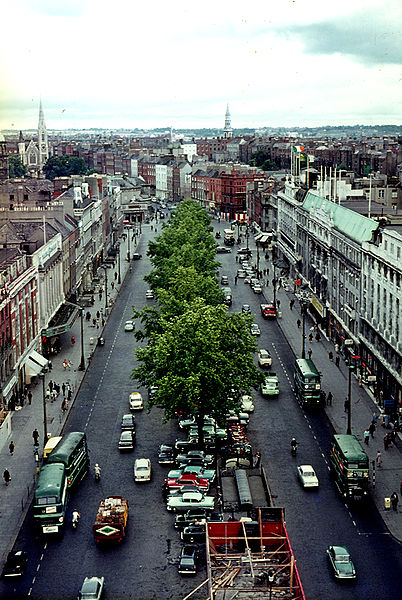Gnáthghiorrúcháin i nGaeilge: Everyday Abbreviations in Irish (not “textese”) Posted by róislín on Apr 11, 2015 in Irish Language
(le Róislín)

Uacht. nó Íocht. i mBÁC? Is this “Sráid Uí Chonaill Uachtarach” or “Sráid Uí Chonaill Íochtarach” i mBaile Átha Cliath? Leid: an bhliain 1964. Má tá a fhios agat an “uachtarach” nó “íochtarach” é, scríobh isteach! (grianghraf: http://commons.wikimedia.org/wiki/File:O%27Connell_St.,_Dublin_from_Nelson%27s_Pillar,_1964.jpg). Ar ndóigh, tá an freagra le fáil sa Vicípéid agus beidh sé ar fáil anseo sa todhchaí.
Long before we started playing with symbols and phrases like “a#” (for “a thaiscidh,” pronounced “HASH-kee, which means “darling” in Irish), we were using giorrúcháin for their most basic purpose, to save space on paper and time in writing or typing. Here are a few quite straightforward ones, which you will likely encounter fairly often in written Irish. Some pronunciation tips are included. There is also a glossary below, with some further pronunciation tips.
B.Á.C. (or often BÁC), Dublin. Baile Átha Cliath, which obviously bears no resemblance to “Dubh-linn” from which we actually get the word “Dublin”.
m.sh., for example (mar shampla) [mahr HAHM-pluh; the “s” is silent]
lch., page (leathanach) [LyA-huh-nukh]
lgh., pages (leathanaigh) [LyA-huh-nee]
Uacht., Upper, as in street addresses. Short for “uachtarach.”
So “Upper O’Connell Street,” in Irish, is: ___________________________ (freagra thíos)
Íocht., Lower, as in street addresses. Short for “íochtarach.”
So “Lower O’Connell Street,” in Irish, is: ___________________________ (freagra thíos)
A few that are less traditional, for reasons which will become clear, are “SEIF” and “VEID.” If I give you a jumbled word bank of the individual words behind an dá acrainm seo, can you sort them out into the actual phrases? Freagraí thíos arís.
Banc Focal: Víreas Easpa Easpa Imdhíonachta Imdhíonachta Faighte Siondróm Daonna
Leid: in Irish, unlike English, both of these acrainmneacha [AK-ran-im-nyuh-khuh] have ceithre litir. In English, one has trí litir, the other has ceithre cinn.
Are there any giorrúcháin that you’ve been wondering about, or any favorite texting abbreviations that you like to use in Irish? If so, please send them in in the comments section. SGF — Róislín
Freagraí:
Sráid Uí Chonaill Uachtarach, or as it’s often abbreviated, “Sráid Uí Chonaill Uacht.”
Sráid Uí Chonaill Íochtarach, again, typically abbreviated as “Sráid Uí Chonaill Íocht.”
SEIF, Siondróm Easpa Imdhíonachta Faighte (AIDS, Acquired Immune Deficiency Syndrome)
VEID, Víreas Easpa Imdhíonachta Daonna (HIV, Human Immunodeficiency Virus)
Gluais agus Fuaimniú:
Baile Átha Cliath, Dublin, lit. the town of the ford of the hurdle. There are at least three pronunciations: BAHL-yuh AW-huh KLEE-uh (very fully articulated), BAHL-yuh KLEE-uh (medium articulated, with the “Átha” part basically swallowed up), and BLAW-KLEE (very colloquial, kind of like “Fluffya” for, hmm, wanna guess? The freagra is below, underneath the entry for “daonna“). “Dubh-linn” means “black pool.”
Ó Conaill, O’Connell. Becomes “Uí Chonaill” [ee KHUH-nil] to show possession, as in “Street of O’Connell.” Not that O’Connell, or any individual, actually owns/owned the street, but the same form is used when streets, squares, etc., are named for someone.
uachtarach [OO-ukh-tur-ukh]
íochtarach [EE-ukh-tur-ukh]
siondróm [SHIN-drohm]
easpa [ASS-puh], lack, deficiency
imdhíonacht [IM-YEE-uh-nukht], usually translated as “immunity,” but sometimes as “immune.” The adjective “immune” is “imdhíonach,” with a typical “-ach” adjective ending.
imdhíonachta [IM-YEE-uh-nukh-tuh], of immunity
easpa imdhíonachta, immunodeficiency (NB: a single compound word in English but two separate words in Irish)
faighte [FAI-chuh; that’s “ai” as in the IPA phonetics symbol /ai/, pronounced like the vowel in the following English words: aye, eye, I, my, pie], “acquired,” also “gotten.” Because the English spellings for this sound are so inconsistent, none of them work well for representing the Irish sound, even in a rough pronunciation guide. The word “faighte” is based on the verb “faigh” (get, acquire), which sounds more or less like English “fie,” but with a broader “f.”
víreas [VEERzh-us], virus
daonna [DEE-nuh], human. This is the adjective, related to words like “duine” (person), “daoine” (people), “daonnaí” (human being, pl: daonnaithe, human beings), and “daonra” (population)
Fluffya – some locals’ pronunciation of “Philadelphia.” The same phenomenon happens, it seems, with “Tronno” [i.e. Toronto], right, a Cheanadacha?

Build vocabulary, practice pronunciation, and more with Transparent Language Online. Available anytime, anywhere, on any device.




Leave a comment: